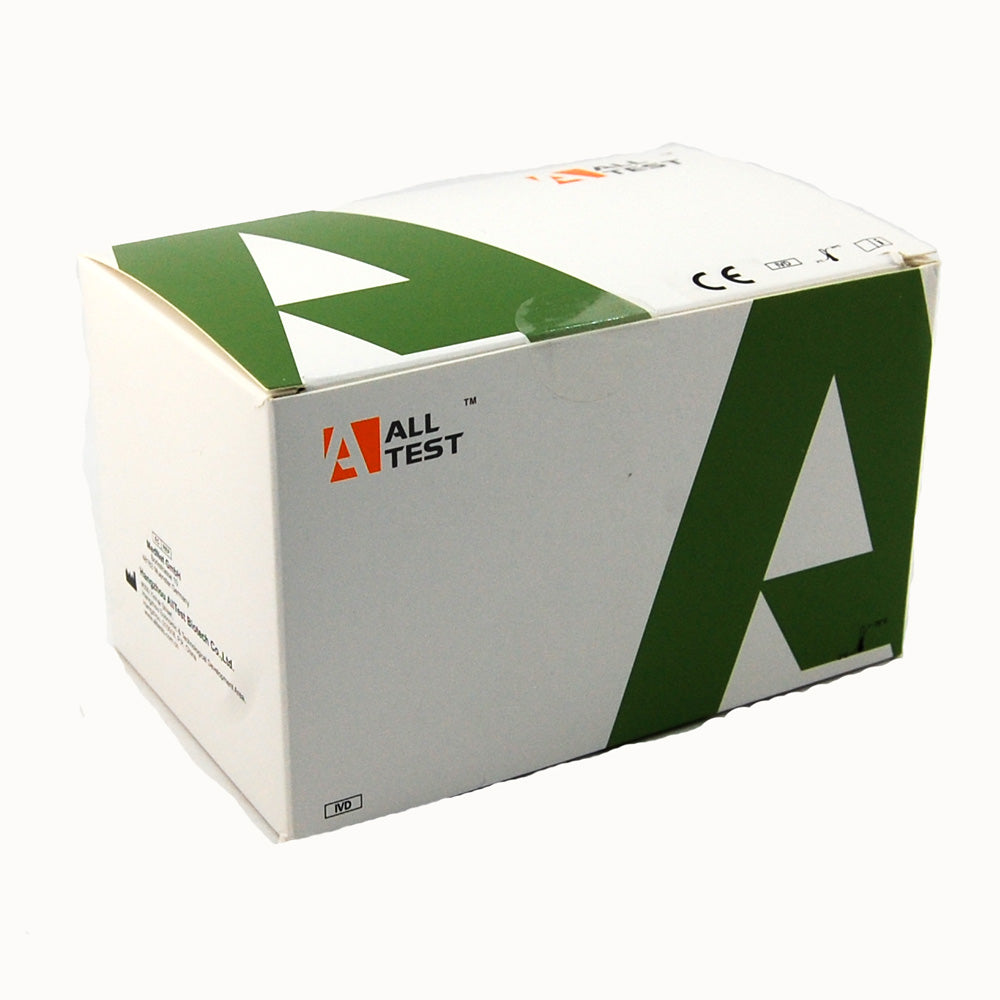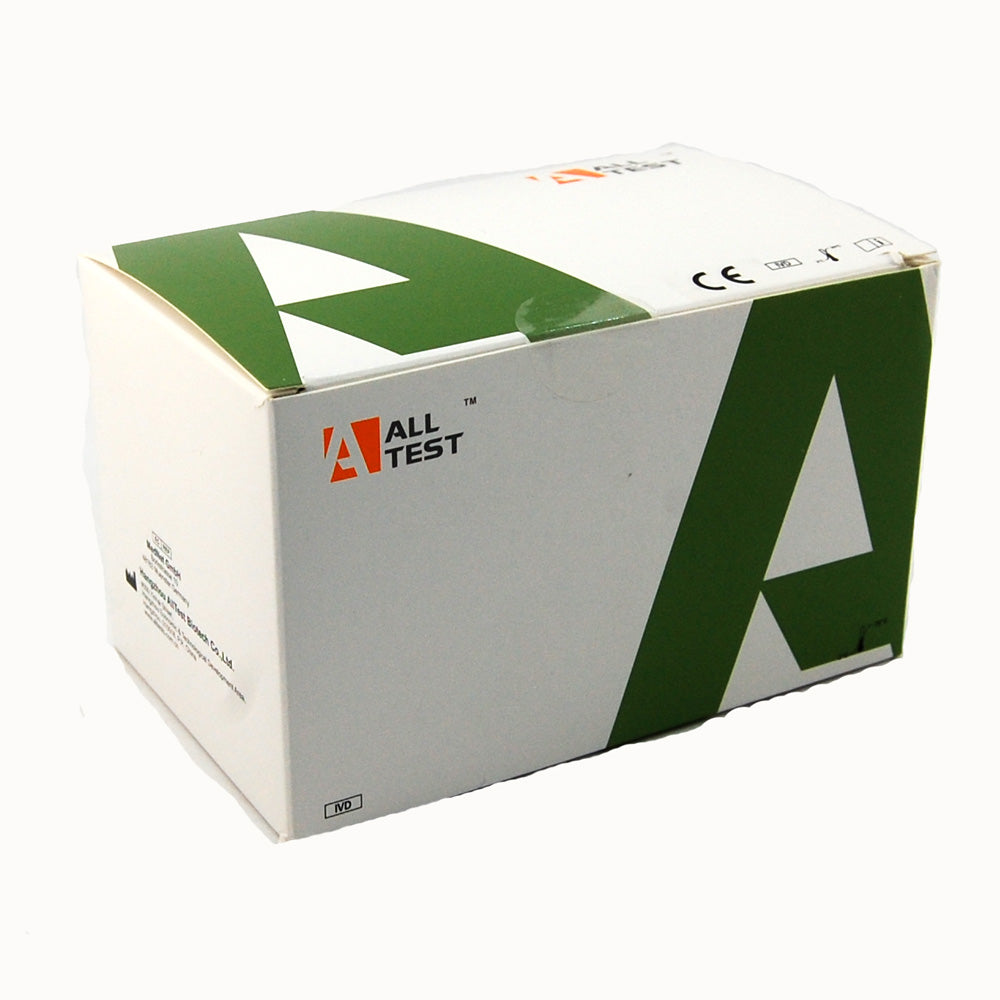Valuemed
ALLTEST Professional CA15-3 Breast Cancer Rapid Test Cassette 10 Test Pack
ALLTEST Professional CA15-3 Breast Cancer Rapid Test Cassette 10 Test Pack
Out of stock
Couldn't load pickup availability
Please note this is a professional medical test kit intended solely for use by healthcare professionals. It is not a home test kit. The equipment for obtaining the blood sample is not provided with the test kits.
CA 15-3 test kit for breast cancer
CA15-3 is the one of the most widely used biomarker for Breast Cancer diagnosis.
ALLTEST CA15-3 test cassettes
The ALLTEST ca 15-3 test kit for breast cancer is to be used for venous whole blood, serum and plasma allow instant onsite identification of elevated CA15-3 levels of 30U/ml and over, as a marker of Breast Cancer Disease.
This is a professional CA15-3 Rapid Test for GP's Health Screening and Hospitals. The CA15-3 Rapid Test Device detects CA15-3 at 30U/ml and over in human blood samples providing on-site results in 10 minutes.
ALLTEST CA 15-3 test kit for breast cancer pack contents:
- Pack of 10 test kits
- 1 buffer 1 data sheet instruction.
Key features of the ALLTEST CA 15-3 test kit for breast cancer
- Each test kit contains everything needed for a complete CA 15-3 test kit for breast cancer test -
- This test is for professional use only ie GP surgeries, clinics, laboratories, occupational health and by healthcare professionals.
- The packs are suitable for venous whole blood samples stored using standard anti-coagulants. Tests suitable for capillary blood samples but no 75u/l transfer tubes are provided.
- The ALLTEST CA15-3 rapid test can detect as low as 30U/ml
- Over 98.3% overall accuracy
- This is a professional medical diagnostic test kit intended solely for use by healthcare professionals.
Main uses of the CA 15-3 test kit
Monitoring breast cancer treatment
- To assess how well a person with advanced breast cancer is responding to treatment (e.g. chemotherapy, hormone therapy).
- A falling CA 15-3 level may suggest that treatment is working, while a rising level could indicate progression.
Checking for recurrence
- After initial breast cancer treatment, CA 15-3 may be monitored over time to detect any early signs of recurrence.
Assessing prognosis
- Elevated CA 15-3 levels at diagnosis may be associated with more extensive disease and a worse prognosis.
A CA15-3 test is not typically used for:
- It’s not recommended for breast cancer screening or diagnosis on its own.
- Not all breast cancers produce CA 15-3, so it’s not useful in every case.
- Also used less commonly in some other cancers like ovarian, lung, or pancreatic cancers.
CA 15-3 levels can be elevated in several non-cancerous (benign) conditions, as well as in some other types of cancer. This is why it’s always important to interpret results in context, alongside other tests and clinical findings.
Non-cancerous conditions that may cause raised CA 15-3 levels
- Benign breast disease (e.g. fibrocystic changes)
- Benign ovarian cysts
- Liver disease (including hepatitis and cirrhosis)
- Lung conditions (e.g. sarcoidosis)
- Autoimmune diseases (e.g. systemic lupus erythematosus)
- Endometriosis
Other cancers that may raise CA 15-3 (usually not as high as in breast cancer)
- Ovarian cancer
- Lung cancer
- Pancreatic cancer
- Colorectal cancer
- Liver cancer
- Prostate cancer
Because of this lack of specificity, CA 15-3 is not usually used as a diagnostic tool on its own but rather as part of ongoing monitoring in known breast cancer cases.
Share

Collapsible content
What is the CA 15-3 test used for?
The CA 15-3 test measures the level of Carcinoma Antigen 15-3 in the blood. It is mainly used to monitor breast cancer, especially in advanced cases, to evaluate treatment response and check for recurrence.
Can the CA 15-3 test diagnose breast cancer?
No, CA 15-3 is not used for diagnosing breast cancer. It is primarily used in patients who already have a confirmed diagnosis, to help monitor disease progression or response to treatment.
How is the test performed?
A simple blood sample is taken, usually from a vein in the arm. The sample is then analysed to measure the CA 15-3 level.
Are there other conditions that can cause elevated CA 15-3 levels?
Yes. CA 15-3 levels may also be raised in non-cancerous conditions such as:
- Benign breast or ovarian conditions
- Liver disease (e.g. cirrhosis)
- Autoimmune diseases (e.g. lupus)
- It may also be elevated in other cancers, including ovarian, lung, pancreatic, and liver cancers.
It may also be elevated in other cancers, including ovarian, lung, pancreatic, and liver cancers.
It may also be elevated in other cancers, including ovarian, lung, pancreatic, and liver cancers.
What do high CA 15-3 levels mean?
A high level of CA 15-3 may indicate:
- Advanced or recurrent breast cancer
- Worsening disease if levels are rising
- Improvement if levels are falling with treatment
However, results must be interpreted by a healthcare professional in context with other tests and clinical findings.
Can CA 15-3 be normal even if someone has breast cancer?
Yes. Not all breast cancers produce CA 15-3, so some patients may have normal levels even with active disease. It is not a suitable marker for every case.
Is this test suitable for cancer screening?
No. CA 15-3 is not recommended for screening the general population for breast cancer, as it lacks the sensitivity and specificity required for early detection.

